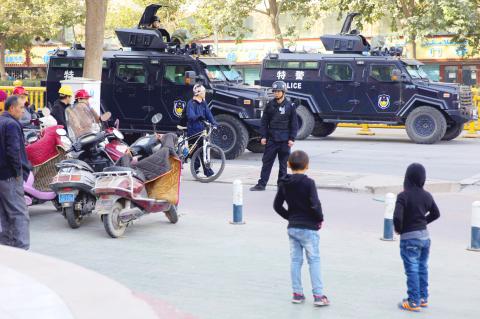China has arrested nearly 13,000 people it describes as terrorists and has broken up hundreds of “terrorist gangs” in Xinjiang since 2014, the government said in a report issued yesterday to counter criticism of internment camps and other oppressive security in the traditionally Islamic region.
The lengthy report said that the Chinese government’s efforts have curbed religious extremism, but gave little evidence of what crimes had occurred.
The far northwestern region is closed to outsiders, but former residents and activists abroad say mere expressions of Muslim identity are punished.

Photo: AP
Criticism has grown over China’s internment of an estimated 1 million Uighurs and members of other predominantly Muslim ethnic groups. China describes the camps as vocational training centers and says participation is voluntary.
Former detainees say they were held in abusive conditions, forced to renounce Islam and swear allegiance to the Chinese Communist Party.
The camps sprang up over the past two years at extraordinary speed and on a massive scale, as monitored by satellite imagery. China maintains a massive security presence in Xinjiang and efforts to independently verify claims by Uighur activists are routinely blocked.
The new report said that “law-based deradicalization” in Xinjiang has curbed the rise and spread of religious extremism.
It said that 1,588 terrorist gangs have been crushed and 12,995 terrorists seized since 2014.
Over that time, 2,052 explosive devices were seized and more than 30,000 people were punished for taking part in almost 5,000 “illegal religious activities,” it said.
It said 345,229 copies of “illegal religious publicity materials” were also seized.
The report sought to underplay Islam’s role in the region’s historical makeup, saying that while it “cannot be denied that Xinjiang received the influence of Islamic culture,” that did not change the “objective fact” that Xinjiang’s culture is a facet of Chinese culture.
“Islam is not the natural faith of the Uighurs and other ethnicities, nor is it their only faith,” it said.
The report shows the “vague and broad definition of ‘terrorism’ and ‘extremism’ by the Chinese government,” said Patrick Poon (潘嘉偉), a China researcher for Amnesty International.
“It’s exactly because of the Chinese government’s arbitrary and vague definition of these terms that leads to mass arbitrary detention of many ordinary people in Xinjiang,” Poon said.
World Uyghur Congress spokesman Dilxat Raxit said that China was using the specter of terrorism in an attempt to undermine sympathy for the Uighur cause.
“The purpose of issuing this report is to seek support for their extreme policies and the trampling of human rights,” Raxit said.

‘ABUSE OF POWER’: Lee Chun-yi allegedly used a Control Yuan vehicle to transport his dog to a pet grooming salon and take his wife to restaurants, media reports said Control Yuan Secretary-General Lee Chun-yi (李俊俋) resigned on Sunday night, admitting that he had misused a government vehicle, as reported by the media. Control Yuan Vice President Lee Hung-chun (李鴻鈞) yesterday apologized to the public over the issue. The watchdog body would follow up on similar accusations made by the Chinese Nationalist Party (KMT) and would investigate the alleged misuse of government vehicles by three other Control Yuan members: Su Li-chiung (蘇麗瓊), Lin Yu-jung (林郁容) and Wang Jung-chang (王榮璋), Lee Hung-chun said. Lee Chun-yi in a statement apologized for using a Control Yuan vehicle to transport his dog to a

BEIJING’S ‘PAWN’: ‘We, as Chinese, should never forget our roots, history, culture,’ Want Want Holdings general manager Tsai Wang-ting said at a summit in China The Mainland Affairs Council (MAC) yesterday condemned Want Want China Times Media Group (旺旺中時媒體集團) for making comments at the Cross-Strait Chinese Culture Summit that it said have damaged Taiwan’s sovereignty, adding that it would investigate if the group had colluded with China in the matter and contravened cross-strait regulations. The council issued a statement after Want Want Holdings (旺旺集團有限公司) general manager Tsai Wang-ting (蔡旺庭), the third son of the group’s founder, Tsai Eng-meng (蔡衍明), said at the summit last week that the group originated in “Chinese Taiwan,” and has developed and prospered in “the motherland.” “We, as Chinese, should never

‘A SURVIVAL QUESTION’: US officials have been urging the opposition KMT and TPP not to block defense spending, especially the special defense budget, an official said The US plans to ramp up weapons sales to Taiwan to a level exceeding US President Donald Trump’s first term as part of an effort to deter China as it intensifies military pressure on the nation, two US officials said on condition of anonymity. If US arms sales do accelerate, it could ease worries about the extent of Trump’s commitment to Taiwan. It would also add new friction to the tense US-China relationship. The officials said they expect US approvals for weapons sales to Taiwan over the next four years to surpass those in Trump’s first term, with one of them saying

INDO-PACIFIC REGION: Royal Navy ships exercise the right of freedom of navigation, including in the Taiwan Strait and South China Sea, the UK’s Tony Radakin told a summit Freedom of navigation in the Indo-Pacific region is as important as it is in the English Channel, British Chief of the Defence Staff Admiral Tony Radakin said at a summit in Singapore on Saturday. The remark came as the British Royal Navy’s flagship aircraft carrier, the HMS Prince of Wales, is on an eight-month deployment to the Indo-Pacific region as head of an international carrier strike group. “Upholding the UN Convention on the Law of the Sea, and with it, the principles of the freedom of navigation, in this part of the world matters to us just as it matters in the